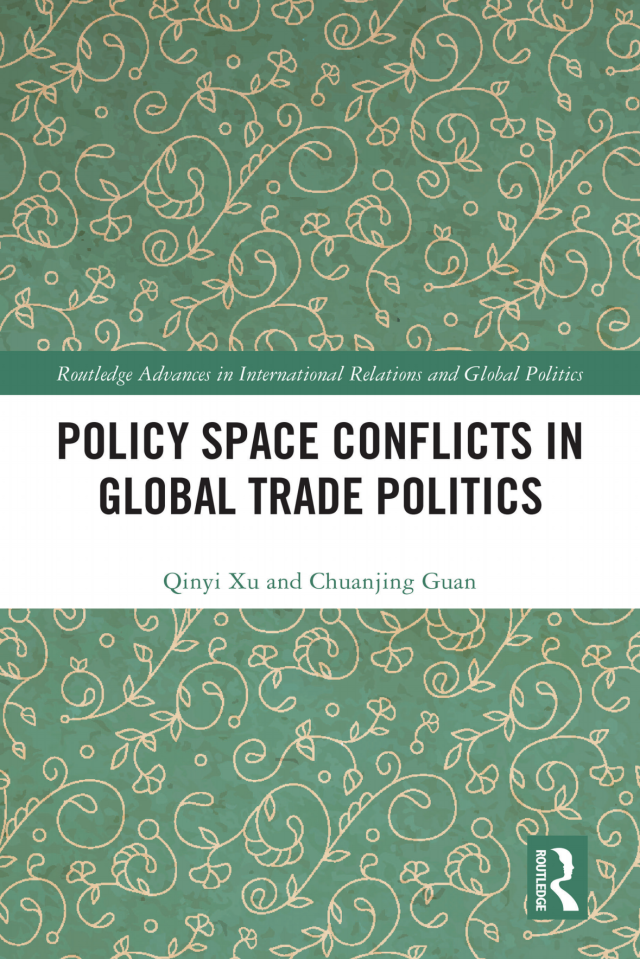
Policy Space Conflicts in Global Trade Politics
By Qinyi Xu, Chuanjing Guan
Routledge,London
Routledge Advances in International Relations and Global Politics Series
2025
【作者简介】
徐沁仪,北京大学国际关系学院助理教授,博士生导师。主要研究领域:非传统安全研究(环境与能源安全等),全球环境与气候治理,气候与贸易政治,国际政治经济学。
管传靖,对外经济贸易大学国际政治经济学系副教授,主要研究领域:国际政治经济学、全球价值链与贸易政策。
【内容简介】
Policy Space Conflicts in Global Trade Politics delves into the structure, driving forces and contemporary influencing factors of trade relations dynamics, providing insights into the present and future trajectories of the global trade order.
The post-pandemic global governance challenges combined with the concurrent, if not concomitant, escalation of economic rivalries between great powers are catalysing a weakening of the liberal international order, undermining the very foundations upon which contemporary global production network is built. With the return of geopolitical tensions, the conflict over global governance versus state governance has again become the nexus where global trade politics are contested and negotiated. This book presents the Policy Space Conflict framework, an analytical framework that diverges from extant concepts of policy diffusion, power transition, socialisation and neo-liberal institutionalist models of analyses, and is instead advanced as a framework that renews the classic concept of ‘policy space’ – the space left for one to freely use preferred national policy instruments when integrated into the globalisation and institutionalisation process in the past decades. The tensions inherent in and arising from policy space can be captured in the term ‘policy space conflict’, illuminating the dynamic shifts regarding the convergence of rules under globalisation and de-convergence concerns of states. This book emphasises the underlying logic and motivating rationale that lie beneath the evolution of ‘policy space conflict’ by theoretically revisiting the concept, providing an overview of its forms in history since the Bretten Woods and transitions from market-oriented to strategy-based. This exploration is examined using case studies drawn from real-world trade politics, which encompasses discussions on the decline of multilateralism, the asymmetry in development between the Global South and Global North and China–US institutional contestation.
This book will be of interest to scholars in the fields of international relations, law, political economy, political science, economics and international trade as well as a broad range of audiences who are concerned of global trade politics in times of global uncertainty.
近年来,大国经济竞争激化引发全球经济治理危机,国际秩序的动荡也侵蚀着当代全球生产分工网络赖以运行的根基。随着国际贸易和投资等领域出现一定程度的地缘政治化趋势,如何全面理解全球贸易体系的走向,成为一个迫切的现实问题。
《国际贸易政治中的政策空间冲突》一书探讨了全球贸易体系的一个核心线索,即经济全球化和规则制度化驱动下的全球治理与多样化的国内治理实践之间存在着动态变化的关系:一方面,市场力量驱动的全球贸易治理要求各国间的规则趋同;而另一方面,现实的国际战略竞争压力则要求大国采取更加符合竞争需要的自主政策,这两者之间的张力产生了多种形态的“政策空间冲突”,提示我们需要思考和研究“如何界定全球治理与国家治理的边界”。
本书提出了“政策空间冲突”的分析框架,用以阐述经济全球化影响下政策空间收缩与扩张的动态演变。经济全球化扩张时期,制度化的全球贸易治理使得主权国家的政策空间被压缩。随着经济全球化进入重构时期,政策空间所面临的全球经济一体化和国际规则趋同化的压力都被削弱。书中系统总结了政策空间冲突的变化周期,并以此视角梳理了全球贸易秩序的变迁过程,分析了多边贸易体系的治理危机,全球南北发展失衡和大国经济竞争等实践案例。
【目录】
Preface
Chapter 1. Introduction
Chapter 2. Theorising Policy Space Conflict: A Convergence Dilemma in Global Trade Politics
Chapter 3. The Evolution of Policy Space Conflicts: Power, Capital and Rules
Chapter 4. The Rise and Fall of Multilateralism: Politicisation of Policy Space Conflicts in WTO
Chapter 5. Asymmetries and Reconfiguration: Divergence of Policy Space Conflicts between Global North and South
Chapter 6. Escalated Institutional Contestation: Policy Space Conflicts between China and the United States
Chapter 7. Policy Space Conflicts in the Global Transformation Era
Chapter 8. Revisiting the Border for Global and Domestic Governance: Is There a Balanced Deal?